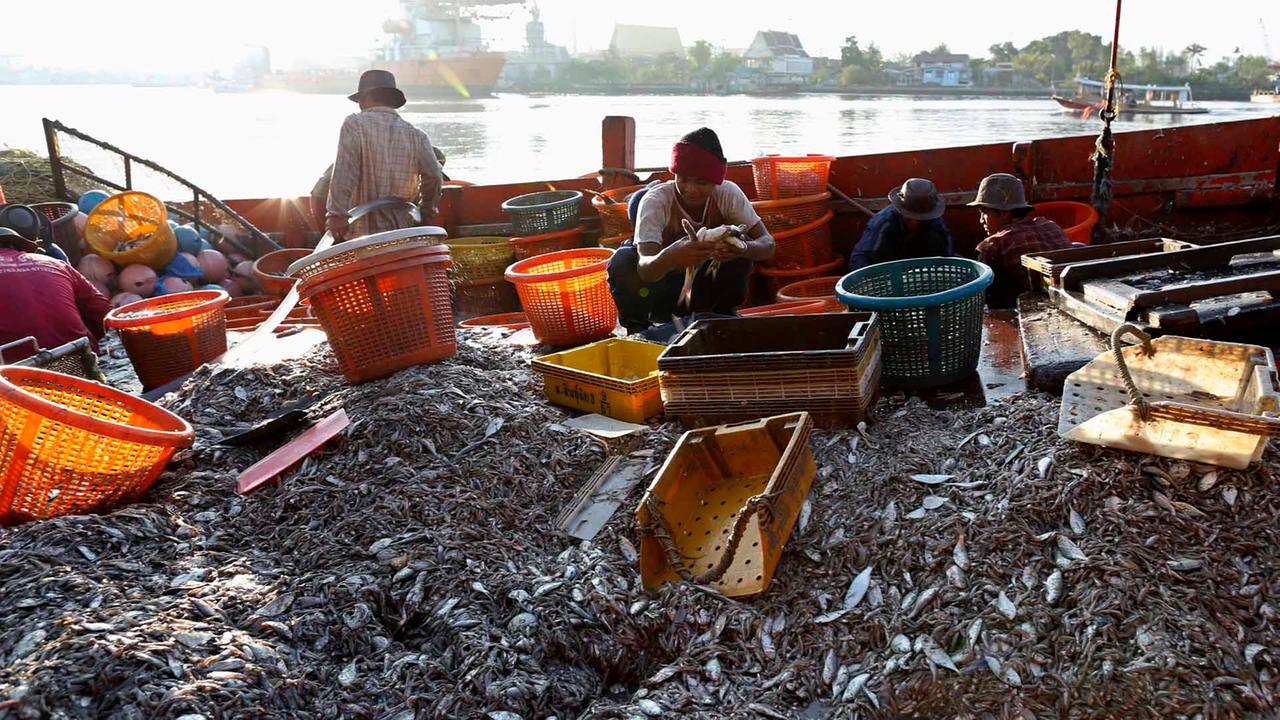Thailand's government wants to relax fishing regulations. This pleases the industry, but causes great concern among small fishermen and human rights activists. Will slave-like conditions return on board?
Heading out to the Gulf of Thailand at sunrise – that's been Kittidet Thedyaem's life since he was eight years old. Today he can make a good living from working on a cutter. But now Thailand wants to change its fishing laws.
This would give large fishing fleets an advantage. Small fishermen like Kittidet fear for their existence. He fears: “The government wants to restrict the fishing areas for small boats like ours so that the big ships can fish more. I think that's unfair. I don't understand who they want to help with this. Certainly not us. Only the business people.”
“Yellow card” with effect
He believes that the EU is also responsible for the fact that things have been going well for him financially in recent years. In 2014, the EU threatened Thailand with a “yellow card” and import bans because of the conditions in the fishing industry. That worked.
The then Thai military government subsequently introduced reforms to combat illegal, unreported and unregulated fishing, known internationally as IUU.
Measures included bans on transfers of seafood and crew at sea or destructive fishing gear such as trawl nets, as well as the introduction of technology to monitor vessels.
Since then, fewer trawl nets have been used and controls over fishing areas have improved. Fish stocks have recovered. Because Thailand's seas began to slowly recover, the EU lifted the “yellow card” threat in 2019.
The economic hardship in the neighboring countries of Cambodia and Myanmar is great. Therefore, many migrants try to earn a living in Thailand's fishing industry.
Industry is pushing for changes
Eight years after reforms to combat illegal fishing, the Thai government is now discussing relaxing fishing laws. This is intended to increase profits for the fishing industry.
Among other things, the bill proposes to reduce penalties for harmful fishing practices and for catching protected marine species.
Mongkol Sukcharoenkana, president of the National Fisheries Federation of Thailand (NFAT) and one of the most influential lobbyists for Thai industrial fishing, supports the planned changes to the law: it is simply not possible to operate economically with the current regulations.
He wants to relax the current regulations again, despite concerns in Europe.
“We don't really care”
But what if the EU threatens Thailand with an import ban again? The NFAT President is ARD calmly: “I'm not worried at all. Thailand hardly exports anything to the EU anymore. Europe is not a big market, it's not that important for us anymore. You can even show us a red card. We don't really care.”
In fact, fish exports from Thailand to Europe have fallen sharply. Today they are only a third of the amount they were nine years ago. The majority of imports go to Japan and the USA.
“Slavery at sea” feared
From Thailand's perspective, the EU no longer has much to say – not even when it comes to “slavery at sea,” as human rights organizations call it. The crews of the ships are often migrants from neighboring Myanmar. At the time, the EU wanted to prevent them from being exploited and mistreated.
But now penalties for such labor law violations are to be reduced again.
Patima Tungpuchayakul, co-founder of the Labour Protection Network, an organisation that campaigns for the rights of ship workers in Thailand, fears:
“If the regulations are relaxed again, it will be the crews who will suffer most. Some people are virtually sold from one ship to another on the open sea, under inhumane conditions. Some do not come ashore for months and are exploited.”
Until 2016, conditions on large fishing trawlers in Thailand were sharply criticized internationally. Since then, working conditions have improved.
Tied up, exploited
The human rights activist looks after victims like San Kyaw Hlaing in Bangkok. He came from Myanmar a year ago, looking for a better living on board a Thai fishing boat. But he was poorly paid and mistreated.
His employers tied him up on board. This led to wounds that became infected. Doctors had to amputate his arm. He remembers the worst time of his life:
“I had to work from 4 a.m. onwards. Casting nets, pulling them in, sorting fish, until sunset and even longer. Until we were allowed to sleep. But at some point I couldn't even sleep anymore. I went crazy, I just wanted to get away.”
In response to the criticism, the fishing association points out that occupational health and safety is regulated by separate laws and is not covered by the changes to the fishing guidelines requested by the NFAT. “The change in the law that we are proposing has no impact on crew members, as there are other laws that regulate this problem,” said the NFAT president. In addition, they do not want to completely reverse the fishing law, but only make changes that have caused problems in practice.
Clear stance in Parliament
In view of the current draft law, the EU is pushing for compliance with fishing standards and warning against regression. A spokesperson for the EU Commission told the newspaper “The Telegraph” that the Commission was very concerned about the Thai legislative proposal. The Commission would not hesitate to take necessary measures if Thailand did not cooperate in combating IUU fishing.
But the law is on its way. In February, the Thai parliament voted unanimously 416-0 in a first reading to relax the regulations.
The new government, led by Prime Minister Srettha Thaivisin, promised to improve the profitability of the country's fishing industry.
Thailand's political parties used the issue as a tactic to gain votes, as commercial fishing is a powerful voter base.
Even the progressive Move Forward Party, which describes itself as environmentally conscious, has abandoned its commitment to sustainable fishing – in what political scientists believe is a way to win elections in provinces dominated by the fishing industry.
The draft must go through further readings before it can be adopted; a decision is not expected before the end of 2024.
Florian Bahrdt, ARD Singapore, tagesschau, 06.06.2024 09:05 a.m.





